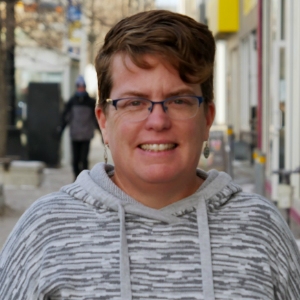News and Releases

Faculty Profiles
Faculty: In Their Own Words - Dr. Jodi Dueck-Read
Thursday, February 6, 2020 @ 3:25 PM | Faculty Profiles
Dr. Jodi Dueck-Read, Assistant Professor of Conflict Resolution Studies, has taught at Menno Simons College as a sessional instructor since 2010 and has been on faculty since 2015.
What do you love about your work here?
I get to create fun, interesting, engaging classes. I get the opportunity to come up with new ideas each year and spend hours on a Friday afternoon thinking through different advocacy measures for change. I also love that I have colleagues that are really pushing me to get involved and pushing me to teach better or to think about how I teach. There's just so much potential here at Menno Simons for being an institution that's really offering something different for students in terms of peace and conflict resolution and international development.
What are you teaching right now that you're most excited about?
I'm teaching Non-Violent Social Change this term, and so I have four student groups next week that are putting on a different non-violent public action here on campus. One of them is doing it about the importance of education as well as education within correctional institutions, and they've just done a fantastic job of preparing for this, so I'm looking forward to that. Another group is looking at Diversity Foods and the accessibility of food on campus, especially in terms of financial accessibility for students. It's exciting to see them take ideas and work them through.
What are you researching and writing?
I'm finishing up some things from the Canadian Financial Diaries, which I worked on with Jerry Buckland and several other research assistants. In terms of other researching, I'm preparing to begin a research project to celebrate Mennonite Central Committee's 100 years. Looking particularly at the way that peacebuilding has been practiced, their philosophy, coupled with the lack of inclusion of queer folks and how that impacts the peacebuilding work they're doing.
Where or how do students give you hope?
Seeing that students are really engaging in the material and they have something to think it through with. One particular student who I've had in two of my classes happens to be a Syrian refugee, so he thinks about these ideas in real-life contexts. So in Non-Violent Social Change, he was exposed to new ideas that just made him reflect and consider things he hadn't thought about before. And for some of my intro students that are thinking about emotions and intergenerational trauma, they're able to then find the words to express some of what they're feeling. So just seeing those lights pop on for students is very exciting for me.
What are you reading for enjoyment?
Dystopian, probably more focused towards youth. One book I read recently was Vox (Christina Dalcher), that looks at what patriarchy could create in different societies when it's really taken out of hand, along the lines of Margaret Atwood. But one of the questions it leaves you with is, what are you willing to do to make change? I think the question is often posed in literature that if you're willing to go towards violence then you're making the ultimate sacrifice. And I want to see that question change. There are non-violent alternatives, can we continue to be creative and come up with some of those ideas?
Do you have any interesting projects underway in the broader community or church?
I've been involved with the Migrant Workers Solidarity Network for many years here in Winnipeg and so that's kind of an ongoing process. There's a lot of people who are working on an access without fear policy, so creating a sanctuary city or a place where people are able to access services regardless of their documentation status, and I'm hopeful to begin more work in that area over the next couple years. The Migrant Trail walk takes place in Arizona and I've been involved with organizing that on a annual basis since 2006. It's a journey that begins at the end of May and goes to early June to raise awareness about migrant deaths. The opportunity to walk in remembrance and to think about people who have lost their lives out there, people who continue to come, really grounds my research and grounds me as a spiritual person connected to many others, connected to the land and the desert.
What saying or motto inspires you?
I think one that's been resonating a lot with students lately and with me is, "nothing for us, without us." The context in which I learned about this motto was talking with disability advocates and how important it was for them to be involved in creating the kind of advocacy that they want. I think it rings true with lots of other things that I'm teaching and the importance of really taking your lead from the community.
KEYWORDS: Jodi Dueck-Read, CRS, conflict resolution studies, Menno Simons College, MSC, faculty, faculty in their own words


 Print This Article
Print This Article